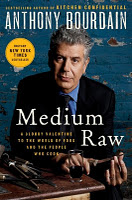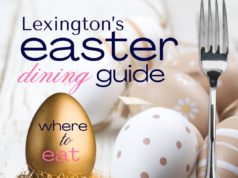It’s been ten years since Anthony Bourdain wrote Kitchen Confidential Updated Edition: Adventures in the Culinary Underbelly (P.S.)
He’s changed (he’s rich; he’s married; he’s a father). The kitchen’s changed. The food world has changed.
But the book opens with old-style Bourdain, in an introduction called The Sitdown (as he describes it “it’s like that scene in The Godfather, where Marlon Brando welcomes the representatives of the five families…”) which chronicles an evening at a gastronome’s table set for 13, “Inside each, a tiny, still-sizzling roasted bird — head, beak, and feet still attached…our host high pours from a bottle of Armagnac, dousing the birds — then ignites them. This is it. The grand slam of rare and forbidden meals…Ortolan.”
Ortolan is the illegal delicacy (“$250 bucks a pop on the black market…a classic of country French cuisine”) consumed as those assembled “place our napkins over our heads, hiding our faces from God, and with burning fingertips, lift our birds gingerly by their hot skulls, placing them feet-first into our mouths — only their heads and beaks protruding.” And so he begins, with the highly controversial and contraband consumption of “The Holy Grail, the Great Unfinished Business, the Thing That Must Be Eaten in order that one may state without reservation that one is a true gastronome, a citizen of the world, a chef with a truly experienced palate — that one has really been around.” (The ensuing description is visceral to the point of obscene.)
His hatred for the Food Network and its mediocritization of food remains undimmed, but his response has admittedly changed, as he’s become part of the same style sales-machinery, “Rachael Ray sent me a fruit basket. So I stopped saying mean things about her. It’s that easy with me now. Really. An unsolicited gesture of kindness and I have a very hard time being mean….” but he adds slyly, “Rachael was shrewd about that.”
[If he had to sell out, at least the fruit basket was from Agata and Valentina; he blogged about it here.) He freely admits “I would have given Oprah a back rub and a bikini wax, had she asked me when her people called.”
Ever the pragmatist, asked by aspiring chefs if they should go to culinary school, he says, “the short answer is ‘No.'”
Are you too old (at 32, for example) to be a chef? Yes. Are you too fat? Probably. (“If you’re comforting yourself with the dictum ‘Never trust a thin chef,’ don’t. Because no stupider thing has ever been said. Look at the crews of any really high-end restaurants and you’ll see a group of mostly whippet-thin, under-rested young pups with dark circles under their eyes; they look like escapees from a Japanese prison camp — and are expected to perform like the Green Berets.”) If you have what it takes and can afford culinary school, apprentice first: “work — for free, if necessary — in a busy kitchen,” and then do it again in the best kitchens you can get into after school. If you have to go into debt, do it for travel.
Fans of No Reservations will enjoy his travelogues of everywhere from Hanoi to Kuching, Borneo to the “uniquely kooky national schizophrenia” of Japan’s Schinkjuku district. There’s a hog killing in Prague (where we do see how the sausage gets made); and there’s a chapter simply titled “Meat.”
Although Bourdain still reserves some of his greatest contempt for vegetarians (asserting more than once his belief that PETA will not be happy until chickens get the right to vote), but a decade after Kitchen Confidential, the devout carnivore acknowledges “I’m beginning to think, in light of recent accounts, that we should, on balance, eat a little less meat.” As a father, he’d like his daughter not to die for cheap meat. As a gastronome, he’s also no fan of factory farming, “I don’t want animals stressed or crowded or treated cruelly or inhumanely because that makes them provably less delicious. And often less safe to eat.”
He’s still bitter about Alice Waters, asserting that her letter to Obama and proposal of the “kitchen cabinet” would “have gone down a lot better had Waters bothered to vote in the previous forty-four years” — but pulls back slightly from his earlier assessment of her as “Pol Pot in a muumuu,” concluding “maybe LSD is a good metaphor for Alice. I may not want any now — but I’m glad she was around. And I may even be slightly better for the experience,” adding “what makes Alice Waters such a compelling character is her infectious enthusiasm for pleasure. She’s made lust, greed, hunger, self-gratification, and fetishism look good.“
As usual Bourdain has a hit list — this time heroes and villains — but some of his choices are surprising. Jamie Oliver a hero? After all the Naked Chef derision? Bourdain explains, “Say what you will about how well, attractively or advisably, but Jamie Oliver puts his money where his mouth is. The sincerity with which he’s focused on school lunches, educating kids on how to cook — and even how to eat — is largely, I gather, unwelcomed, and relative to potentially more purely profit-oriented exercises, maybe not the best of options.” He admires Oliver’s willingness to establish himself as “annoying nag.”
Also a hero: Wylie Dufresne for “amazing skills, a restless mind — and balls the size of pontoons.” More shockingly, he lists Alain Ducasse as a villain, citing ADNY as the moment “where fine dining jumped the shark.” Also shocking: James Beard House makes the list of villains, followed by an anecdote surrounding his friend Sydney chef Matt Moran’s experience flying halfway across the world to cook there. Mario Batali/Eric Ripert/ and Jose Andres make the heroes list for raising more money for charity “than movie stars and CEOs fifty times wealthier than they are.”
There’s an entertaining chapter profiling Erik Hopfinger, a season 4 loser on Top Chef, and another on David Chang (Momofuku Ko). But Bourdain is at his best shadowing Justo Thomas as the 47-year old cuts the fish for Le Bernadin, then accompanying Thomas to his first protocol-defying meal in the dining room (“once you let employees start drinking in their own place of work — even on their days off — you’ve unleashed the dogs of war. No good can come of it.”)
Is this a kinder, gentler Bourdain? Not really. The chapter “Alan Richman is a douchebag” pretty much speaks for itself. He’s just grown up a little. As he told Entertainment Weekly, “I think the bad-boy thing is getting a little old. It’s useful to remind people that I’m a dad now. I’m not going to be buried in a leather jacket…and the earring’s gone.” (He’s appropriately attired in a suit for the new cover.)
Meanwhile, the food world has changed, and its popularity exploded. As he points out, “Cooking has already become ‘cool.’ So, maybe, it is now time to make the idea of not cooking ‘un-cool.'”
He said a mouthful.









